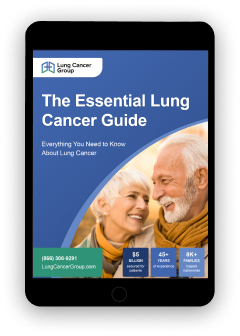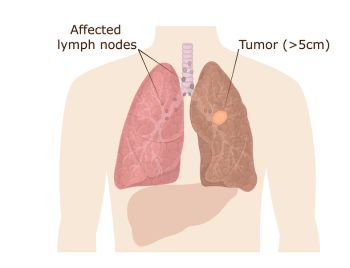Stage 3 Lung Cancer
Stage 3 lung cancer has started to spread outside of the lungs to other parts of the body. However, patients can still get treated to improve life expectancy and potentially become long-term survivors. Lung Cancer Group can help you seek compensation for stage 3 lung cancer treatments and other costs if you qualify.
What Is Stage 3 Lung Cancer?
Lung cancer stage 3 has begun to spread beyond the lungs to other organs in the chest. This stage of lung cancer is considered locally advanced.
Stage 3 lung cancer tumors may be found in:
- Bronchus (main airway of lungs)
- Diaphragm (muscle that helps with breathing)
- Esophagus
- Heart and heart lining (pericardium)
- Lymph nodes in either side of the chest
- Mediastinum (space between lungs)
- Pleura (lung lining) and chest wall
- Spine
Stage 3 is harder to treat than the earlier stages of lung cancer, but some patients can achieve long-term survival with aggressive treatment.
“I drove my kids across the country by myself this summer. We made memories, and that’s really important to me — being able to make memories. That’s all I want to keep doing.”
– Brandi, stage 3 lung cancer survivor
Lung Cancer Group may be able to help you or a loved one afford treatments for stage 3 lung cancer. Get our Free Lung Cancer Guide now to learn more.

- Understand risk factors
- Find top treatments
- Pursue compensation



Stage 3 Non-Small Cell Lung Cancer
When staging non-small cell lung cancer (NSCLC), doctors follow the Tumor-Node-Metastasis (TNM) staging system. Roughly 20% of NSCLC patients are diagnosed in stage 3, according to a 2023 study from The New England Journal of Medicine.
There are three substages of stage 3 NSCLC. Learn about each below.
Stage 3A Lung Cancer
These tumors are 3-7 centimeters in size. Doctors may find 1 or more lung cancer nodules (growths) on the lung. The cancer has spread to nearby lymph nodes on the side of the body closest to the primary tumor.
Stage 3B Lung Cancer


Stage 3C Lung Cancer
Tumors range in size from 5-7 centimeters or larger. Doctors find at least 2 nodules on the lung. The cancer could be in lymph nodes on either side of the chest wall.
Stage 3 Small Cell Lung Cancer
The TNM system isn’t used to stage cases of small cell lung cancer (SCLC). Rather, SCLC cases are either in a limited stage or an advanced stage. The limited stage is equivalent to stages 0-3 of the TNM system.
Symptoms of Stage 3 Lung Cancer
Stage 3 is the point when patients start to develop lung cancer symptoms if they haven’t already. Symptoms become more noticeable in patients who already have them.
Common stage 3 lung cancer symptoms include:
- A cough that won’t go away and has blood in it
- Fatigue
- Headache
- Hoarseness
- Numbness in the hands and arms
- Pain in the bones or chest
- Shortness of breath
- Swollen lymph nodes
- Weakness
- Weight loss
“I developed a cough that would not go away. Besides the cough, I did not have any other lung cancer symptoms. I’d still been exercising, lifting weights, and doing yoga.”
– Nancy, stage 3 lung cancer survivor
If you have any of these symptoms and were exposed to possible lung cancer causes, like cigarette smoke or asbestos earlier in life, see a doctor immediately.
Do you have symptoms of stage 3 lung cancer? Call (877) 446-5767 to learn if we can help you access compensation for treatments.
Diagnosing Lung Cancer Stage 3
Health care providers typically use a series of tests to diagnose lung cancer and determine the stage.
Stage 3 lung cancer diagnostic tests commonly include:
- A basic physical exam
- Imaging scans like X-rays, CT scans, or PET scans
- A biopsy (removal of fluid/tissue sample to look for cancer cells)
A biopsy is the only way to confirm if a patient has lung cancer or not. Doctors use additional imaging scans to see if a patient’s cancer has advanced to stage 3.
Stage 3 Lung Cancer Treatment Options
Treatment options for lung cancer stage 3 depend on your health, age, and cancer spread. Learn about top stage 3 lung cancer treatments below.
Lung Cancer Surgery
Lung cancer surgery involves removing cancerous cells from your lungs and nearby tissues. It may or may not be used to treat stage 3 lung cancer.
“Some stage 3 patients may just have cancer in one small lymph node, and it’s easy to remove surgically. But we have other patients with large lymph nodes growing into surrounding structures, and it’s not possible to remove the cancer surgically.”
– Dr. Linda Martin, lung cancer surgeon at UVA Health
You may qualify for surgery if you have stage 3A NSCLC, according to the American Cancer Society (ACS). If you have SCLC, doctors may use lung cancer surgery if they think they can remove the tumors.
Get our Free Lung Cancer Guide to learn more about surgery and other treatments for stage 3 lung cancer right now.



- Understand risk factors
- Find top treatments
- Pursue compensation



Chemotherapy for Lung Cancer Stage 3
Chemotherapy uses powerful drugs to kill rapidly growing cells. It is often the main treatment for lung cancer stage 3 and is typically used with radiation.
Oncologists (cancer doctors) can use chemotherapy before or after surgery to treat NSCLC and SCLC. These methods are known as neoadjuvant chemotherapy and adjuvant chemotherapy, respectively.
Immunotherapy for Lung Cancer Stage 3
Immunotherapy helps the immune system fight cancer. Immunotherapy drugs like Keytruda® (pembrolizumab), Tecentriq® (atezolizumab), and Imfinzi® (durvalumab) could help stage 3 lung cancer patients live longer.
Radiation Therapy
Radiation therapy uses X-rays and other types of energy to kill lung cancer cells. Radiation may be the main treatment for stage 3 NSCLC, depending on the patient’s overall health.
The National Cancer Institute (NCI) notes that doctors often combine chemotherapy and radiotherapy to treat limited-stage SCLC. Some patients are also treated with radiation to the brain to ensure the cancer doesn’t spread there.
Targeted Therapy
Targeted therapy treats lung cancer by attacking specific genes and proteins that control how cancer cells grow and spread.
According to the ACS, a targeted therapy drug called Tagrisso® (osimertinib) could help stage 3A NSCLC patients with certain gene mutations live longer.
Stage 3 Lung Cancer Prognosis
A stage 3 lung cancer prognosis depends on your age, treatment plan, health, and substage. You may live longer if you have stage 3 NSCLC, are younger, and get multimodal treatment (where several therapies are used together).
Learn about stage 3 lung cancer life expectancies and survival rates — the two key ways a prognosis is measured — below.
Stage 3 Lung Cancer Life Expectancy
Life expectancy is the average survival time of patients. Stage 3 lung cancer life expectancy with treatment is favorable, with patients living for several years on average.
Stage 3 NSCLC patients lived for 47.5 months, or nearly 4 years, when treated with Imfinzi and chemotherapy in a 2022 study.
The life expectancy for limited-stage SCLC patients who received radiation was 28-30 months, or roughly 2.5 years, in a 2023 Journal of Clinical Oncology report.
Stage 3 Lung Cancer Survival Rate
Survival rate is the percentage of patients still alive after a set period of time.
In a 2023 study published in The New England Journal of Medicine, stage 3 NSCLC patients who received chemotherapy, immunotherapy, and surgery had a 2-year survival rate of 85%.
According to cancer treatment center City of Hope, limited-stage SCLC has a 5-year survival rate of 18% if it has spread to nearby body parts. A 2023 Journal of Clinical Oncology study noted that 5-year SCLC survival rates increased to 29-32% when radiation was used.
Get Help After a Stage 3 Lung Cancer Diagnosis
Dealing with a stage 3 lung cancer diagnosis can be daunting as treatment costs can add up, even with insurance. This can put extra stress on top of an already scary situation.
You don’t have to fight lung cancer stage 3 by yourself. Lung Cancer Group may be able tohelp you seek financial compensation to afford medical treatments and other expenses.
Call (877) 446-5767 or get our Free Lung Cancer Guide to find out if you could qualify for stage 3 lung cancer compensation. Our dedicated Patient Advocates are standing by to assist you.
Stage 3 Lung Cancer FAQs
How long can a stage 3 cancer patient live?
Stage 3 lung cancer patients have an average survival time ranging from 32-47.5 months, according to recent studies.
Some patients may live even longer depending on how their body responds to treatments, becoming lung cancer survivors.
For example, Nancy was diagnosed with stage 3 adenocarcinoma lung cancer in 2015 and given just a year and a half to live. However, thanks to multiple treatments, she survived for 9 years.
Can you recover from stage 3 cancer?
Yes, it may be possible for you to recover from stage 3 lung cancer and become a long-term survivor. The key is to get treatment that can remove or shrink tumors.
Diagnosed with stage 3A lung cancer in 2017, Mike is still living today after undergoing multiple treatments, including surgery, chemotherapy, and radiation. His cancer was originally considered terminal.
Contact us now for help affording treatments that can help you potentially recover from stage 3 lung cancer.
What is the new treatment for stage 3 lung cancer?
A newer treatment for stage 3 lung cancer is immunotherapy. Doctors continue to study how this treatment can be used in combination with others in clinical trials to help lung cancer patients live longer.
For example, a 2023 study published in The New England Journal of Clinical Medicine found that combining immunotherapy and chemotherapy allowed more stage 3 lung cancer patients to achieve remission than those treated with only chemotherapy.
Is stage 3 cancer a death sentence?
Stage 3 lung cancer is not necessarily a death sentence. It may be possible for you to become a long-term survivor depending on which treatments you receive and how the cancer responds to them.
Brandi was diagnosed in 2017 at the age of 39. “Emotionally, it was very, very tough,” she said. “It’s gotten easier to deal with over the years. I am doing great. I’ve had no evidence of disease since 2018.”
Stage 3 lung cancer treatments can be expensive, but we may be able to help you afford them. Call (877) 446-5767 to get started.
Why is stage 3 lung cancer inoperable?
Lung cancer stage 3 may or may not be inoperable. It depends on how far the cancer has spread.
The American Cancer Society (ACS) notes that patients with stage 3A NSCLC may qualify for surgery, but those with stage 3B or higher might not. Your doctor can give you a better idea if you’re a candidate for stage 3 lung cancer surgery.
Can stage 3 lung cancer go into remission?
Yes, stage 3 lung cancer could go into remission in some cases. Stage 3 lung cancer remission means there are no or fewer signs of cancer, and many patients live longer as a result.
For example, a report published in Translational Lung Cancer Research found that a stage 3 patient achieved complete remission thanks to chemotherapy and immunotherapy.

